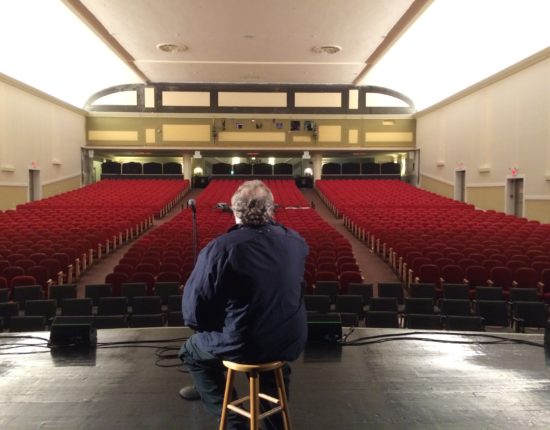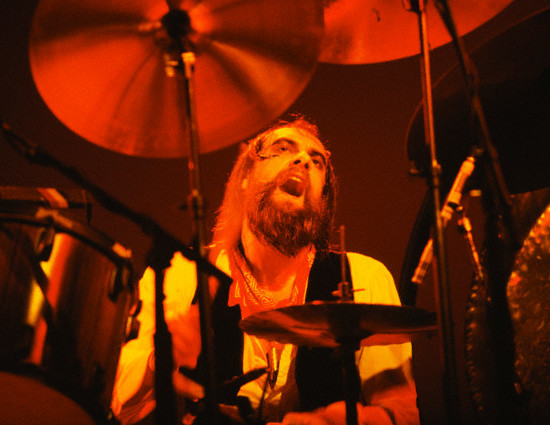“Anthony Bozza understands what it is to love music, to hear every note as if you’re by yourself and it’s being played just for you.”
– Cameron Crowe
Anthony Bozza still has the first record he ever bought, Billy Joel’s Glass Houses. He also has the first record he ever “got,” which is a 45 of Blondie’s “Heart of Glass” that he stole. Both records came from the same store, Record Town in Manhasset, Long Island. He was 9 years old, and has been obsessed with music ever since. Around the same time, he also figured out that he loved to read and began consuming long, detailed books, mostly from the UK, by Charles Dickens, J.R.R. Tolkein, and C.S. Lewis as well as Americans like Mark Twain and Walter Farley. Anthony went through school loving history and English while suffering through math and science and in college chose to study the only thing they didn’t teach him about in high school: the history of Africa and the Middle East. Simultaneously, he developed a passion for investigating the details he found in the fine print at the bottom of album liner notes and curated a library of bootleg studio and live recordings of The Grateful Dead, The Rolling Stones, The Cure and The Smashing Pumpkins, who became his favorite local band during the four years he spent living in Chicago attending Northwestern University.
He graduated, spent a year ski bumming in Boulder, Colorado, intending to return to school with the goal of becoming a professor, but that didn’t happen. Instead, both of his passions came together when he got an internship at two very different culturally significant magazines in the same day: Paper and Rolling Stone. Though he preferred the downtown cool of Paper, it was obvious (as spelled out to him by a staffer at Paper) that the latter position held greater promise of a paying job, one which would allow him to quit bar tending at that horror-movie themed pub in the West Village.
And so it went. Anthony Bozza worked as an intern for the now defunct Rolling Stone Press division, becoming an adept researcher, tracking down the likes of Giorgio Moroder and Kim Fowley for the update to Rolling Stone’s Rock & Roll Encyclopedia (1995), which led to his salaried gig as an assistant to the magazine’s Librarian. From there it was a game of checkers: he moved over to the Music Department and was an assistant to several Music Editors (two of whom were fired – the 90’s were a tumultuous time). Through diligent perseverance, he began to land the odd piece in the magazine, usually by volunteering for whatever assignment the staff writers didn’t want to do. He moved up to a a featured columnist, helmed the Raves column, Random Notes, and did stories on all kinds of things, like the greatest Summer Songs ever written and whatever happened to Sly Stone (he learned, at the time, that Sly was living in LA with two nubile 19 year old twin sisters). Along the way Anthony ate pastrami with Bo Diddley and had Ozzy Osbourne tell him the now legendary story of how he snorted a line of live ants in order to show his upstart opening band, Mötley Crüe, who was boss. Anthony also hung out and profiled a bunch of actors and was the only staffer excited to go to Staten Island to interview Wu Tang Clan. In 1997 or so, he became obsessed with an unsigned white rapper from Detroit named Eminem and told his music editor all about him. His boss entertained Anthony’s enthusiasm, and two years later, when said rapper was signed to Interscope, did the right thing and dispatched him to do a short story about the making of the video for a song called “My Name Is.” What was assigned to be a 250 word piece ballooned into a 6000 word cover story, the first national coverage of Eminem anywhere. It was quite the story too, it made Anthony’s career, and Eminem’s too, in a way.
In the next few years, Anthony Bozza wrote six more cover stories, before leaving Rolling Stone to write what would become his first New York Times Bestseller, Whatever You Say I Am: The Life and Times of Eminem. The book was an international hit as well, lingering atop bestseller lists in England, Germany, France and South America. More than a biography, the book contextualizes Eminem as a signpost of the race, class and cultural temperature of America at the turn of the millennium.
He then turned to co-writing, jumping the fence with Tommyland, the NYT Bestselling autobiography of Tommy Lee. Tommy moved Anthony into his house and into his world, and all of it is in the pages. The two of them remain the best of friends to this day.
Afterwards, Anthony relocated to Australia for three months, to research INXS Story to Story: The Official Autobiography. He met with just about everyone who ever worked for the beloved Australian band still living on the Sydney side of the continent. A detailed retelling of the band’s history, it is the definitive document of the Michael Hutchence era, including interviews with some of the deceased singer’s nearest and dearest, several of whom hadn’t spoken about him publicly since his death.
He then returned to LA to co-write another NYT Bestseller, Slash: It Seems Excessive But That Doesn’t Mean It Didn’t Happen, with the famously private, taciturn Guns n’ Roses guitarist. The result was dubbed one of the top five rock autobiographies of all time by Rolling Stone and it should be: equal parts debauchery and musicology, it’s as honest and timeless as Slash’s guitar tone.
Returning home to New York City, Anthony changed gears, signing on to write with veteran comedian, Howard Stern co-host, and fellow East Coast Italian-American Artie Lange. The resulting book, Too Fat to Fish, changed his idea of co-writing forever, and debuted at #1 on the New York Times Bestseller list, where it remained in the top 20 for twenty-two weeks. Both touching and hilarious, it transcended the comedian memoir as genre, making fans of readers who had never before heard of Artie Lange.
Next came a return to music analysis, with Why AC/DC Matters, a thesis arguing the merits of one of rock and roll’s most critically shunned yet essential institutions. Why AC/DC Matters set the record straight and inspired a series of similarly formatted Why (blank) Matters books in AC/DC’s native Australia with Anthony’s book being Volume 1.
I Am the New Black, co-written with SNL and 30 Rock star Tracy Morgan came next and was yet another challenge. Though Tracy’s off-the-wall perspective came through stylistically, the struggle and heartbreak he’s survived in life was what emerged most powerfully – and surprisingly – on the page.
Anthony’s next book, Purpose: An Immigrant’s Story, co-written with Wyclef Jean, detailed the Haitian musician’s impoverished childhood in his homeland and rise to hip-hop superstardom in America. It answered a question that had been lingering for nearly ten years – why exactly did the Fugees break up? The writing of the book was interrupted by two seismic events: the tragic earthquake in Haiti and Wyclef’s decision to run for President of his homeland. He came back from those experiences a changed man, and fittingly the book changed with him.
While working with Wyclef, Artie Lange reached out to Anthony to begin the process of writing their follow up to Too Fat to Fish. He had spent two inert years recovering from depression, drug addiction and a suicide attempt and had barely survived his darkest depths. They slowly began to piece together what became Crash and Burn, their second New York Times Bestseller and one of the hardest pieces of writing Anthony has ever undertaken.
In 2012, an assignment for Playboy magazine brought Anthony to Hawaii to interview legendary drummer Mick Fleetwood of Fleetwood Mac. The two formed a bond and embarked on two years of work and intense soul searching on Mick’s part, resulting in Play On: Now, Then & Fleetwood Mac. The memoir captures a life unlike any other, spanning forty years of rock and roll from the perspective of one of the most gifted, thoughtful and humble characters in the history of classic rock.
Throughout the spring and summer of 2014, Anthony tailed Derek Jeter, the greatest baseball player he’s ever seen play the game, as he prepared to take his final bow. The resulting interviews became the narrative text of Jeter Unfiltered, a collection of intimate photos commemorating his last season as well as his twenty year career. As a lifelong Yankee fan, Anthony was on cloud nine. As a sports fan, he had been eager to work with an athlete, and couldn’t have dreamed of a better place to start.

